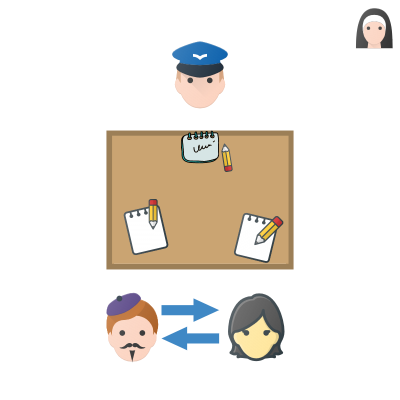CAE SPEAKING TEST PART 3
In part 3 you and your speaking test partner are given a 'mind-map' (or 'spider web') with five keywords linking to a theme. The themes are often universally interesting ones such as 'health' or 'the environment'. If the topic is 'health', the keywords will be things like 'diet', 'exercise', 'sleep', and so on. Have you ever had a conversation about the food you eat or how well you slept? Of course you have. In part 3, that's what you do. (The theme in this picture is communication.)
It's often called the 'collaborative task' because for the first time in the CAE Speaking test, you have to work as a team.
You discuss the first question for two minutes, and then there's another question you talk about for one minute.
1. Interaction diagram
You discuss things with your partner.
2. About the 2015 changes
In the olden days, part 3 used pictures instead of keywords. Cambridge changed it because candidates described the pictures instead of discussing the topics.
Cambridge also split the task in two. Before 2015, candidates were given 3 minutes to discuss the topics AND decide which was the most important. They changed it because a lot of candidates quickly decided which topics were the most important and had nothing left to talk about.
The new system helps make sure students have a full discussion before coming to a decision.
3. What is 'collaboration'?
Collaboration means team work. In parts 1 and 2 you talked on your own. If you were following these tips, you looked at your speaking test partner and listened to what they said. But now you have to talk to them, too.
Imagine you're watching Roger Federer playing tennis against Rafael Nadal. It's fascinating because they keep hitting the ball back to each other. What will the other person do with the ball now? That's the excitement of tennis.
Now imagine that Nadal hits the ball to Federer, and Federer catches it, holds it in the air, and runs around the stadium saying 'Look at me! Look at me!' It would be entertaining for a short time, but then everyone would get angry and begin to hate the Swiss superstar. The angriest person of all would be the umpire, who would announce that Federer had lost the match.
To succeed in part 3, you have to
ask your partner questions
agree and disagree with what they say
include them in every step of the process
be interested in what they have to say
The difference between you and Federer is that you aren't trying to 'beat' your partner. By hitting the ball to them (asking them questions/letting them talk) you will both win.
4. What if my speaking partner is shy/nervous/aggressive?
If you're worried about this, you're not alone! Almost every candidate gets stressed thinking about who their partner might be and how this partner might ruin THEIR chances of getting a good grade!
The first thing to know is - you can choose your partner! If you know someone who is taking a CAE course in your area you can register together and list them as your speaking partner. Problem solved!
But if you don't have that luxury, don't worry - the only person who affects your grade is you. The Cambridge examiners are EXPERTS and they have seen everything many times before. They will understand whatever situation you are in.
If your partner talks too much in part 3 they will penalise him, but not you. If you have to talk too much because the other candidate is so nervous, that won't count against you.
Whatever happens in part 3, the examiners will assess your performance in the whole Speaking test in a fair way.
(Having said that, you should be able to interrupt people who are talking too much - see Speaking Test part 4, bullet point 7 for some ideas.)
5. Common mistakes
Monologues (you shouldn't talk more than 20/25 seconds without passing the ball to your partner)
Not reacting to your partner's ideas
Getting stuck on 1 topic (it's very easy to talk about one keyword for a long time, but you should try to organise your conversation so that it covers everything on the mind map)
Rushing through all the topics without analysing them at all (it's better to talk about 4 in a meaningful manner than 5 in a superficial way)
Dead air (many candidates race through the 5 topics in less than a minute, look up at the examiner and are shocked to find they have more time. Keep talking until the examiner stops you! These topics are HUGE with many, many issues behind them)
Nodding and other non-verbal communication (socially normal, but this is a speaking test. At least say 'yes' while you are nodding!)
Getting sidetracked (for example, if the topic is 'How important are these things for our health?' many candidates will say explain why health is important. That's not the question! The correct answer to 'how important' is: not important/quite important/very important.)
6. Useful language
Linking words and ways to organise the discussion. The examiners will be impressed if you can:
combine two keywords into one point ("well, I think exercise and sleep are similar things - they're both connected to your physical health")
move from topic to topic in an elegant way ("so I totally agree with you that exercise can contribute a lot to having a healthy life. And I think that brings us to this point about sleep, because if you exercise a lot you'll sleep better.")
include your partner in the process ("So shall we move to the next point?)
Some useful language about asking questions and agreeing/disagreeing can be found in part 4 (scroll down), but they are also essential parts of your toolkit in part 3.
7. The second third
So you spent two minutes talking about the theme, and you discussed most/all of the keywords. The examiner will stop you, and then ask you a follow-up question. It will include words like 'most', 'best', or 'easiest'. These words make it possible for you to come to a decision.
If the topic was health, the examiner will say, 'Now you have about a minute to decide which of these things can benefit people the most.'
Note that word 'minute'! Deciding the answer too soon will lead to ... dead air! Always start by eliminating two or three options (giving reasons).
Start by saying, 'Well it definitely ISN'T [xxx] because [yyy].'
8. Videos
Watch this video in which I give tips to a couple of German students. They have read the tips in this section and do pretty well.
9. More More More
looking for more help?
I've got reviews of online English courses, books, smartphone apps and more on the Courses, Products, Tools page. Nothing is very expensive and you're sure to find something that helps you out.
And don't forget we've got lots of articles about improving your English and passing CAE.
Like these:










A Skype coaching call with Sebastian and Tim. In this video we focused on Part 3 of the Speaking test.